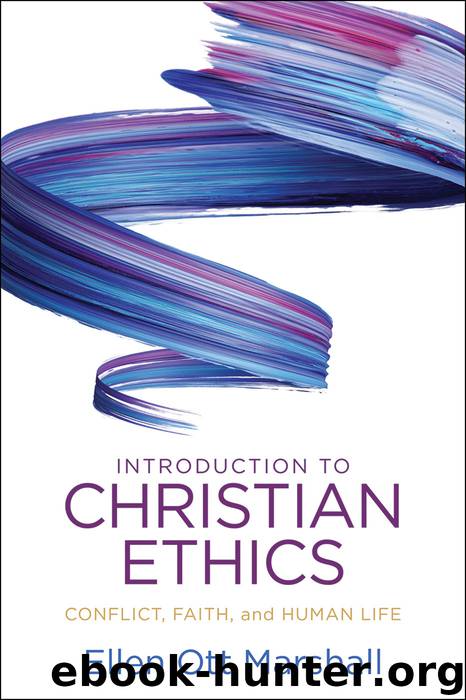Introduction to Christian Ethics by Marshall Ellen Ott;

Author:Marshall, Ellen Ott;
Language: eng
Format: epub
ISBN: 5974080
Publisher: Presbyterian Publishing
STORIES AND PRACTICES OF RECONCILIATION
Within Christian ethics there is a vast amount of writing on reconciliation with a variety of theological-ethical resources in play.67 For the purpose of this chapter, I lift up a perspective on reconciliation that privileges the health of bodies, prioritizes the needs of marginalized persons, and turns to marginalized persons as a resource for thinking about reconciliation.
In her writing on reconciliation, womanist theologian Stephanie Mitchem insists on a “socially grounded picture of reconciliation” in which “personal commitments are analyzed in light of social responsibility.”68 Utilizing womanist methodology, she situates her exploration of reconciliation in the experience of “black women in social contexts”69 and draws on interviews with members of the Detroit Metropolitan Black Women’s Health Project.70 In this work, Mitchem argues that “African American women enact a theology of reconciliation” by linking health with healing and spirituality with wholeness.71 Through her interviews, she identifies practices related to healing, defined by one interviewee as “the integration of the self.”72 The practices of reconciliation include “community building, anti-dissemblance, personal and social empowerment, self-discovery, and advocacy.”73 Mitchem then turns to theological and ethical writings from other womanist scholars and black theologians to assert, “Womanist reconciliation, then, aims toward personal and communal wholeness; it remains centered in, and informed by, spirituality.”74 This work of healing also requires challenging societal forces and cultural practices that threaten well-being. Thus, in her final paragraph, Mitchem offers this description of reconciliation informed by language of the Negro spiritual that also gives her essay its title: “In such a holistic view, reconciliation challenges all oppressive, dehumanizing systems, not merely restoring to former order, but rebalancing the old so that a new heaven and earth can begin.”75
Mitchem’s writing echoes the description of reconciliation from Emilie Townes cited in the beginning of this chapter. Townes writes, “It is my deep belief, from the particular perspective of the Black woman in the United States, that an ethic of justice is rooted in two concepts: liberation and reconciliation.”76 These concepts emerge from and respond to the particular experiences of African American women, and they reach “to the whole church and the whole society,” according to Townes. In language very similar to Mitchem’s description of healing, Townes writes that liberation aims “to restore a sense of self as a free person and as a spiritual being.”77 In Jesus’ death and resurrection, Townes see “God’s work of salvation” as the “promise of wholeness through our brokenness.” As noted earlier, Townes describes objective reconciliation as “God’s activity in our lives,” giving us the gift of freedom through grace and love. We remain faithful to God’s gift by living with respect toward and in harmony with others; this is subjective reconciliation.78 Transformation requires both liberation and reconciliation, though Townes eschews a particular order for them. “Working together,” she writes, “liberation and reconciliation, pointing toward the freedoms found in transformation, name the oppression of our lives and our institutions for what they are—sinful—and demand that we work with God for a new thing—the reign of God in all of life.
Download
This site does not store any files on its server. We only index and link to content provided by other sites. Please contact the content providers to delete copyright contents if any and email us, we'll remove relevant links or contents immediately.
The Lost Art of Listening by Michael P. Nichols(7506)
Why I Am Not A Calvinist by Dr. Peter S. Ruckman(4153)
The Rosicrucians by Christopher McIntosh(3521)
Wicca: a guide for the solitary practitioner by Scott Cunningham(3179)
Signature in the Cell: DNA and the Evidence for Intelligent Design by Stephen C. Meyer(3138)
Real Sex by Lauren F. Winner(3023)
The Holy Spirit by Billy Graham(2953)
To Light a Sacred Flame by Silver RavenWolf(2823)
The End of Faith by Sam Harris(2742)
The Gnostic Gospels by Pagels Elaine(2531)
Waking Up by Sam Harris(2461)
Nine Parts of Desire by Geraldine Brooks(2369)
Jesus by Paul Johnson(2363)
Devil, The by Almond Philip C(2333)
The God delusion by Richard Dawkins(2309)
Heavens on Earth by Michael Shermer(2285)
Kundalini by Gopi Krishna(2185)
Chosen by God by R. C. Sproul(2165)
The Nature of Consciousness by Rupert Spira(2108)
